IRGC-Linked Website Demands Hijab Compliance By Foreign Diplomats
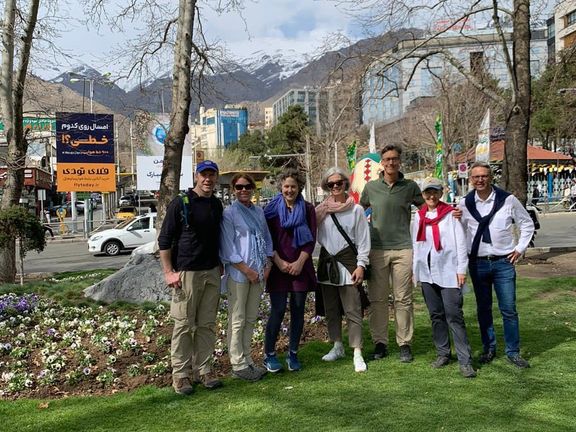
Iran’s IRGC-affiliated Fars news agency slammed the outings of ambassadors and their families in public without mandatory hijab.

Iran’s IRGC-affiliated Fars news agency slammed the outings of ambassadors and their families in public without mandatory hijab.
The hardline website on Sunday demanded that the Ministry of Foreign Affairs deal with the diplomats who do not obey the Islamic dress code.
Fars published photos of three tourists in a car with diplomatic license plates in Khorramabad, western Iran, saying these people included a man wearing short pants and two women without headscarves.
“Removing hijab by the ambassadors and their wives is not unprecedented. For example, during Nowruz this year, the envoys of the United Kingdom, the Netherlands and Denmark broke the laws of our country by walking with their wives who were not covered with veils on Valiasr Street in Tehran and then published the pictures on social media,” added Fars.
Frank Molen, the Netherland’s Ambassador to Tehran, published some photos of his excursion in the Iranian capital along with some colleagues in March.
Fars called such moves "mischievous" behavior that are "in non-conformity with diplomatic rules" claiming that they are supporting the “riots” in Iran.
Fars also launched a petition asking its audience to sign to put pressure on the foreign ministry to deal with the issue.
Four decades after the Islamic Republic made hijab mandatory, women are increasingly appearing in public in regular clothing such as colorful dresses and with no headscarf covering their hair.
Since the death of the 22-year-old Mahsa Amini in the custody of morality police and the protests that engulfed the country for months many women have discarded their headscarves altogether and vowed never to wear it again.
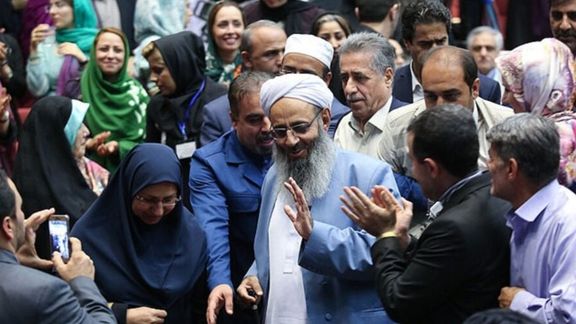
Iran’s religious intellectuals or modernists have expressed support for a top Sunni cleric who has come under pressure from the government for his fiery sermons.
“We believe that given the absence of liberalism and courage among Shia clerics, [the Sunni] Mowlavi Abdolhamid must receive all-encompassing support from Iranians in Iran and abroad,” a statement released Saturday by fifteen prominent political, academic and media figures said.
Security forces during the week arrested several people close to Mowlavi Abdolhamid, the outspoken leader of the Sunnis in Sistan-Baluchestan, including his grandson. The regime has been pressuring him to put an end to criticism of the government in his very popular Friday sermons in Zahedan, the capital of the southeastern province.
Abdolhamid’s sermons which make headlines almost every Friday have been followed by anti-government protests since what has come to be known as the Bloody Friday of Zahedan.

On September 30, 2022, security forces opened fire on civilian anti-government protesters killing more than 93 protesters including children and onlookers in Zahedan after Friday prayers.
This week’s Friday prayers in Zahedan were for the first time since then led by Mowlavi Abdul Ghani Badri, the interim Friday imam of Zahedan. Abdolhamid who had delivered a sermon the previous day for the Muslim holiday of Eid al-Adha, asked worshippers to march silently instead of the usual protests and chanting.
The religious intellectuals praised Sunni clerics who, particularly in the predominantly Sunni provinces of Kordestan and Sistan-Baluchestan, who have turned into “symbols of resistance and endurance of the Mahsa Movement.”
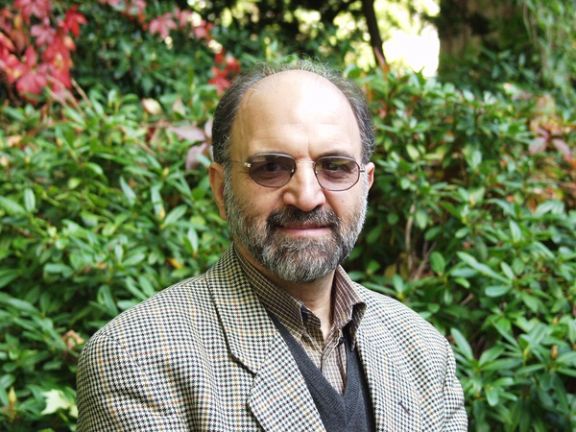
Signatories of the statement underlined that in addition to democracy and social justice, establishment of a government in Iran in which religion and state are separate is necessary. The intellectuals included philosopher and theoretician Soroush Dabbagh (Abdolkarim Soroush), female Islamic scholar Sedigheh Vasmaghi, former cleric Hassan Yousefi Eshkevari, historian Hashem Aghajari, Muslim scholar Mohammad Javad Akbarin, and commentator and journalist Reza Alijani.
Speaking to Iran International TV, Turkey-based political science researcher Meysam Badamchi who is among the signatories of the statement said Abdolhamid is now speaking not only about the wishes and demands of Sunnis but also those of other Iranians when he criticizes the government.
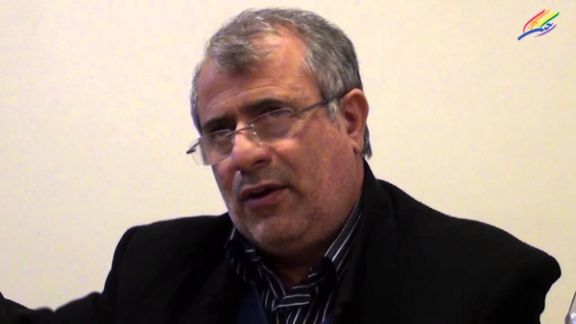
The signatories – who come from a Shia background themselves -- wanted to defend the rights of Mowlavi Abdolhamid as a Sunni cleric and the right of the people of Iran to criticize the government at a time when the Shia clerical establishment has chosen to remain silent about violation of people’s rights, he said.
“Religious Intellectual” refers to a number of political groups and public figures who believe in separation of religion and state and respect freedom of choice. Unlike theoreticians of the Islamic Republic, they consider religion a personal matter rather than the source of laws that regulate politics, economy and society.
They do not believe in the rule of Islamic jurist (Velayat-e Faghih (Wilayat al-Faqih) or Supreme Leader) which gives a cleric such as Ali Khamenei extraordinary powers including the power to overrule all elected bodies and officials and hence, people’s choice.
As a system of governance, Velayat-e Faqih has underpinned the way the Iranian regime has operated since the country’s 1979 Islamic Revolution. At its most basic, the theory, advocated by some Shia thinkers, justifies the rule of the clergy over the state.
Religious intellectuals have usually joined forces with reformists to create alliances against conservatives and hardliners (often collectively referred to as Principlists) at the times of elections.
Religious intellectualism has a long history in Iran and the Islamic Republic. Philosophers and theologists such as Abdolkarim Soroush, Mohsen Kadivar, Mohammad Mojtahed-Shabestari and politicians such as Mehdi Bazargan, the first prime minister of the Islamic Republic, have defined the tenants of religious intellectualism over the past few decades.
The non-religious opposition generally looks at religious modernists with caution, given their desire to completely severe ties between politics and religion.

Russia launched an overnight drone attack on Kyiv after a 12-day break, with air defense systems destroying all the UAVs, Ukrainian military officials said Sunday.
The country's air force said that the attack included eight Iranian-made Shahed drones and three cruise missiles which were shot down.
"Another enemy attack on Kyiv," Serhiy Popko, a colonel general who heads Kyiv's military administration, said in a post on the Telegram channel.
Iran has supplied hundreds of Shahed kamikaze drones to Russia since mid-2022, angering the United States and its key European allies who have imposed sanctions on a host of companies and individuals involved in their production and shipment to Russia.
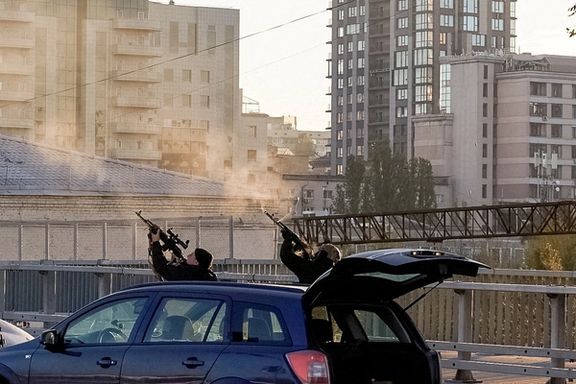
Washington has demanded that Tehran should stop its supply of weapons to Moscow if it wants to reach a new nuclear agreement and see US sanctions lifted.
Although Ukrainian forces quickly learned to shoot down most Iranian drones, Russia uses the cheap weapon to overwhelm air defenses and force Ukraine to use much more expensive Western anti-air missiles.
Three private houses were damaged as a result of falling drone debris in the Kyiv region, injuring one person, the military head of the region, Ruslan Kravchenko, said on his Facebook page.
Reuters witnesses heard blasts resembling the sound of air defense systems hitting targets. There was no immediate information about the scale of the attack.
Kyiv, its surrounding region and a number of central and eastern Ukraine's regions were under air raid alerts for about an hour after 2 a.m. local time (2300 GMT).
With reporting by Reuters, The Kyiv Independent
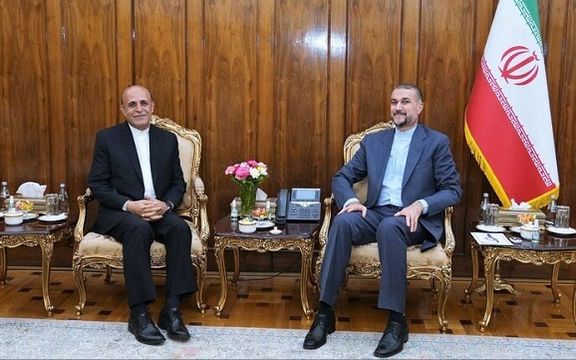
Iranian state media quoted an informed source as saying that the Islamic Republic currently has no plans to send a new ambassador to Sweden.
The state-run IRNA news agency reported Sunday that the decision was made after the burning of the Quran by a man in the European country.
This comes as local media earlier reported the administrative procedures for sending the new ambassador are completed. They also published a picture of the new ambassador Hojatollah Faghani and the Minister of Foreign Affairs, Hossein Amir-Abdollahian.
Faghani previously worked in the embassies of the Islamic Republic in Tbilisi and Brussels and was also the ambassador to Dushanbe, the capital of Tajikistan.
Two men publicly burned the Quran outside Stockholm's central mosque on Wednesday, an act approved by a Swedish court.
It was deliberately timed to coincide with the significant Muslim holiday, Eid al-Adha, further magnifying the incident's significance.
The act led to protest rallies in several Muslim countries, with Iraqis holding a large demonstration outside the Swedish embassy in Baghdad.
Iran’s foreign ministry also summoned Sweden’s charge d’affaires in Tehran.
Several Muslim nations as well as the European Union condemned the latest incident of desecration of the Quran on Saturday.
“Manifestations of racism, xenophobia and related intolerance have no place in Europe,” Nabila Massrali, the EU spokesperson for foreign affairs and security policy, expressed in a statement.
“The EU joins the Swedish Ministry of Foreign Affairs in its strong rejection of the burning of a [copy of the Holy] Quran by an individual in Sweden. This act in no way reflects the opinions of the European Union.”
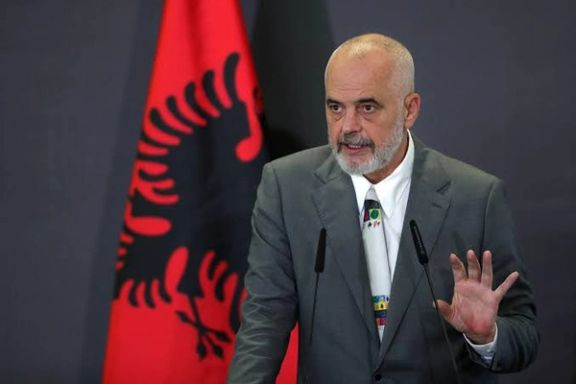
Edi Rama, Albania's prime minister, said in an interview with Der Spiegel on Friday that the Mujahideen cannot use Albania to fight the Iranian regime.
A few days ago, the Albanian State Police, on the orders of the Special Court, conducted checks in the Mojahedin-e-Khalq (MEK) camp, resulting in clashes between its residents and security forces.
The opposition group said on June 20 that hundreds of Albanian police officers raided the group's exile center, Camp Ashraf, in an unexpected move.
The group alleged one of their members, identified as Ali Mostashari, died and more than a hundred others were injured, with some hospitalized in critical condition after police raided the camp using tear gas and pepper spray and seizing computers. The group claimed the attack was instigated by the Iranian regime.
Albanian authorities denied any loss of life or injuries, saying that the incident happened due to the group’s refusal to cooperate with the police.
Police said it had suspicions that there may be people on the premises involved in cyberattacks against Tirana as well as criminal “acts of larger dimensions.”
Rama told Spiegel although the MEK are welcome, they should not use Albania as a political platform.
“Albania has no intention of being at war with the Iranian regime. Albania does not accept anyone who has abused our hospitality,” he added.
He also noted that Tirana accepted thousands of the MEK members under a life-saving operation at the request of the Obama administration in 2016.
“Our country is used as a trench in a war that is not ours, it does not work! Of course, they have every right to fight for their freedom, but to do so they must leave Albania,” the prime minister noted.
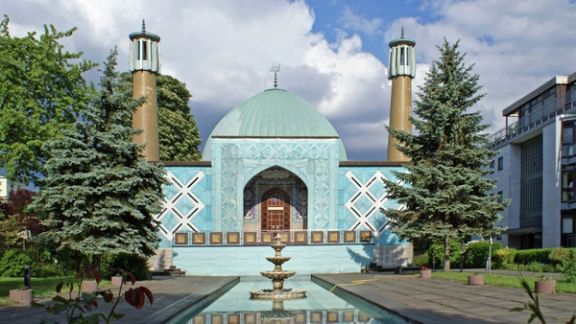
The German Federal Administrative Court ruled that the Blue Mosque, an Islamic center in Hamburg affiliated with the Iranian regime, is an "extremist Islamic organization."
Despite an objection and complaint filed by the center, the Administrative Court of Hamburg upheld the classification of the center's activities as "extremism" by the Federal Office for the Protection of the Constitution of Germany.
The Court began hearing the complaint of the Islamic Center of Hamburg two months ago. However, the decision did not confirm findings by security organs that the center acted as an extension of the Iranian regime in Germany.
Previously, intelligence officials in Hamburg published documents that showed the connection of this center with extremist and Islamist groups, including Lebanon’s Hezbollah.
However, the center claims to be a purely religious foundation that deals with the religious affairs of the Shias.
Earlier, the Secular Islamic Association had asked Germany's Minister of the Interior in a letter to terminate all cooperation with the Central Council of Muslims immediately.
Additionally, the letter said that the Islamic Center of Hamburg promoted Iran's ideology and monitored Iranian citizens in exile as well as disseminating anti-Semitism.
Hamburg's local authorities expelled Seyed Soleiman Mosavi-Far, the deputy for the Islamic Center in November, accusing him of close ties to terrorist groups.
Aside from his involvement in and support for extremist and terrorist Shia organizations, Mosavi-Far had connections with two organizations providing financial assistance with connections to Hezbollah in Lebanon, according to German authorities.